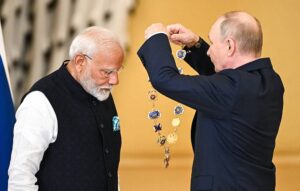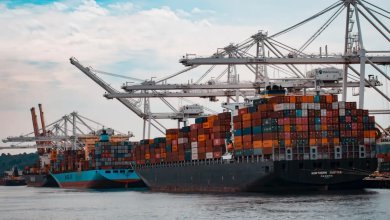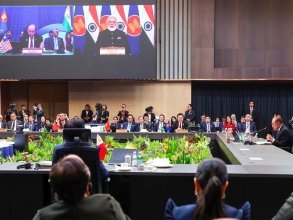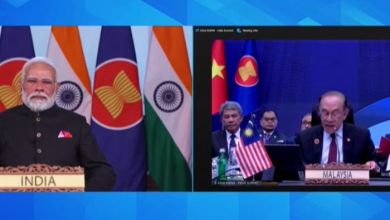Why was PM Modi’s visit to Russia strategically important?

By Shishir Gupta
New Delhi: The event of Russian President Vladimir Putin giving royal treatment to Prime Minister Narendra Modi during his two day visit to Moscow this week has caused serious heartburn in the west, particularly those with myopic strategic vision and in the context of the current complex security environment in Asia.
In many ways, PM Modi’s traditional warm embrace of President Putin was a signal to him that Russia does not have to lean for support only from China to counterbalance the western pressure post Ukraine war. It was also a signal to the west making it very clear that India does not want its vulnerability against China to become a vulnerability with Anglo-Saxon powers in future. The first visit of Indian PM to Austria since 1983 also showed that India was willing to engage a non-NATO power for garnering hi-tech infrastructure technologies and winter equipment.
Rather than some western propaganda media labeling the Modi-Putin hug as a rebuff to India’s western friends, the bilateral meeting in Moscow should be seen in the context of past legacy when west particularly US was promoting dictators in Pakistan than Indian democratic leadership for the Great Game in Afghanistan and the military rise of China. Even though it is a fact that erstwhile Soviet Union stayed out of 1962 war at the behest of Mao Zedong, the western support to Pakistan in 1965 and 1971 wars and during the Khalistan-Kashmir terrorism decades of 1980-2000 , have ensured that Indian national security planners clearly believe that Bharat is on its own in case of a worst case scenario with China or any other adversary. And that is the reason that PM Modi is totally committed on Aatmanirbhar Bharat and believes that Agniveer scheme will lay a nationalistic foundation for 2047 Viksit Bharat.
At a time when PM Modi is making bold diplomatic moves in the interest of India, it is time that Indian diplomacy and intelligence are tuned to Bharat’s requirements as the country marches to become the third largest economy in the world this decade.
Given that India believes in strategic autonomy and is not in alliance with neither the west or Chinese camps, it is imperative that Indian diplomats stop suffering for ‘localitis’ particularly when posted in the west and start defending Bharat without US or Russia bias. Signs of this movement are already visible in the Indian diplomats posted in the western countries.
Despite Anglo-Saxon powers trying to push back the Indian counter-terrorism apparatus by taking up the cause of proscribed individuals like Hardeep Singh Nijjar and G S Pannun, India needs its intelligence agencies to have real time domain awareness at least of its prime adversaries. Fact is that Indian intelligence has little idea of why Chinese President Xi Jinping has been firing his PLA generals particularly those belonging to Rocket Force and why were the two former Defence Ministers with PLA allegiance expelled from the Communist Party and why Dong Jun of the PLA Navy is currently heading the Ministry of Defence. Putting all these moves as a ramification of Xi Jinping’s anti-corruption drive appears to be rather simplistic. What is the operational capability of a Chinese J-20 fighter with a Russian reverse engineered engine? What is the state of anti-China ferment in Tibet and Sinkiang ? There are many questions that Raisina Hill needs answers to as India now faces China all along the heavily militarized 3488 km Line of Actual Control with Beijing muscling into Bhutan next to the highly vulnerable Siliguri corridor. The PLA is advancing its military bases closer to the LAC even in areas which it occupied way back in 1958 and 1962, thus throwing the 1993-96 peace and tranquility agreements out of the window.
With China having huge economic and military leverage over India’s neighbors particularly Pakistan, Nepal, Bangladesh, Sri Lanka and Maldives, the Modi government has no options but to build both economic and military capacities against China and its proxies as support from the west will always come with conditions attached. This apart, the internal security and counter-intelligence has to be strengthened to tackle the huge intelligence apparatus of the west powers, Pakistan and China as well as internal adversaries propped by them in Kashmir, Punjab and hinterland. Prime Minister Modi’s task has become more difficult with the Indian opposition deciding to live up to its name.




